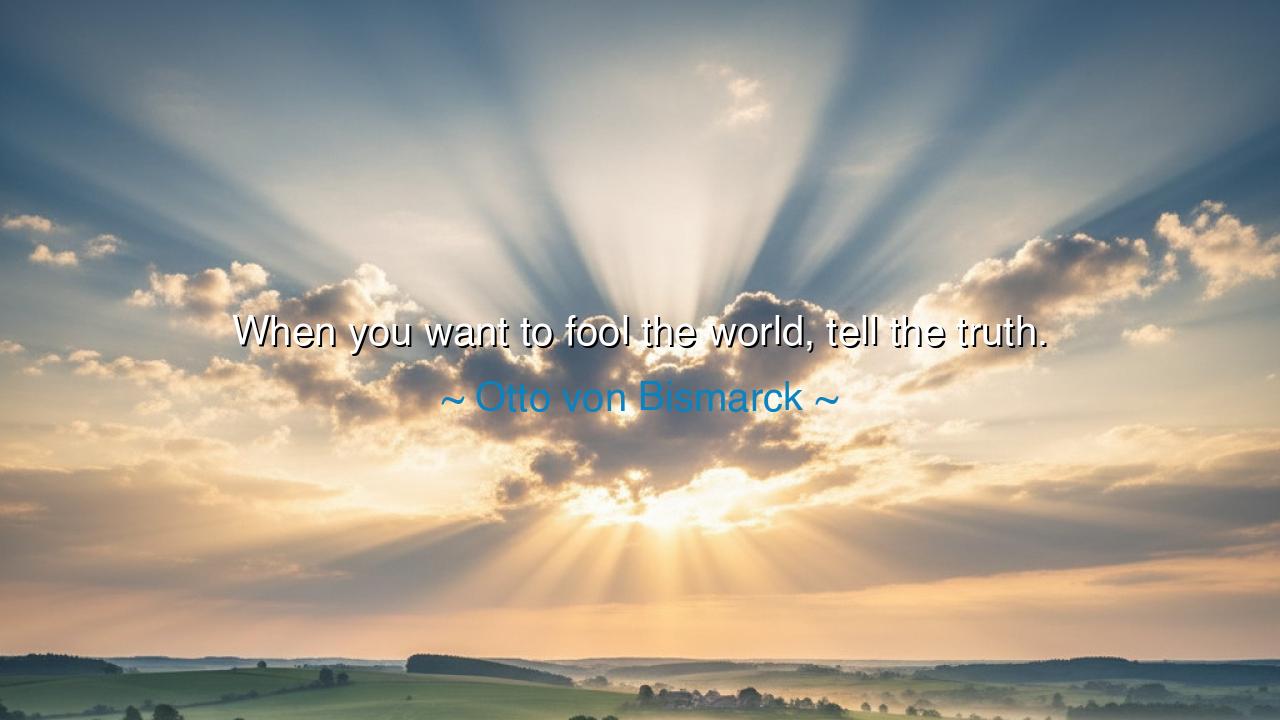
When you want to fool the world, tell the truth.






“When you want to fool the world, tell the truth.” Thus spoke Otto von Bismarck, the Iron Chancellor of Germany, a man as shrewd as he was powerful, who forged an empire not by chance but by cunning. His words strike us as paradox, yet within them lies a deep and ancient wisdom: that the truth, so rarely expected, can be the most deceptive weapon of all. Men are so accustomed to hearing half-truths, masks, and illusions that when a man speaks plainly, they often dismiss it as a ruse. Thus, the truth itself can serve as the cleverest disguise.
The ancients knew this strange irony well. Consider the story of the Trojan Horse. The Greeks, weary of war, left what seemed a gift of surrender. The truth was there before the Trojans’ eyes: “This wooden horse carries men within it.” Yet because deception was expected, the simple truth was overlooked, and Troy fell by its own blindness. In this we see Bismarck’s lesson: at times, truth appears so unbelievable in its nakedness that it becomes the ultimate trick, hidden in plain sight.
Bismarck himself wielded this paradox with mastery. In politics, when rumors swirled and suspicion reigned, he often stated his intentions outright. Rivals, convinced he must be scheming, dismissed his words as misdirection. Yet he had told them openly what he would do, and when events unfolded, they found themselves deceived not by lies, but by their own disbelief in honesty. Such is the cunning of the statesman: to recognize that truth, unexpected, can be more confounding than any falsehood.
History gives us another tale: Winston Churchill in the days before World War II. He thundered that Hitler was a menace, that rearmament was urgent, that war was near. He spoke the plain truth, yet many thought him an alarmist, a man exaggerating for his own glory. When the storm at last broke, the world realized it had been fooled not by Churchill’s lies, but by ignoring his honesty. The truth, spoken openly, was the most unbelievable thing of all.
This saying also reveals a deeper meditation on human nature. Men crave comfort, and lies often provide it. They are prepared for deception, even suspicious of it, but they are rarely prepared for a truth that unsettles them. In this weakness lies the power of Bismarck’s paradox: the bold man who speaks plain truth in a world of lies may pass for a deceiver, and so his words, ironically, are not believed. Thus truth itself becomes a cloak.
Children of tomorrow, learn this well: never underestimate the power of truth, both as a light and as a riddle. When spoken with clarity, it can cut through deceit; when spoken in a world addicted to lies, it can pass unseen, like a hidden jewel. Do not wield it as Bismarck did, for cunning alone, but know its strange force: that the most powerful deception is often no deception at all.
Let your practice be this: honor truth for its own sake, but understand how men receive it. Speak it boldly, even when others cannot believe. Do not be dismayed if your honesty is doubted—this has ever been the way of the world. For as Bismarck knew, the truth is stranger than falsehood, stronger than lies, and sometimes the cleverest mask is the one that shows its face openly. And he who masters this paradox may stand unshaken amidst the storms of suspicion, walking the razor’s edge of power and wisdom.






HDTruong Hai Dang
This quote suggests that the truth can be a double-edged sword. While it can be a way to reveal reality, it can also be used to create confusion and mislead people. Have you ever experienced a situation where the truth was so surprising that it became hard to believe? Can truth, when presented in a certain light, actually make things worse?
BPBao Phung
The idea of using truth to deceive others is quite unsettling. Why would someone use the truth in this way? Can the truth really be a tool for deception? It makes me wonder about the psychological aspect behind this concept. How does the world’s perception of truth change when it’s used in such a strategic manner?
DPNguyen Duc Phuc
It’s fascinating how this quote plays with the idea of truth as a weapon. If telling the truth is often a way to fool the world, does this imply that truth itself is a form of manipulation? Could there be a situation where lying might be more ethical than telling the truth, especially if the truth is too complex or dangerous to comprehend?
MLMai Linh
This quote raises an interesting point about the paradoxical nature of truth. When we tell the truth, it can often appear so shocking or unconventional that people are more likely to dismiss it. Do you think this is a strategy used by politicians or public figures to manipulate perception? It seems that by exposing the truth, you can confuse or mislead others into thinking it’s a lie.